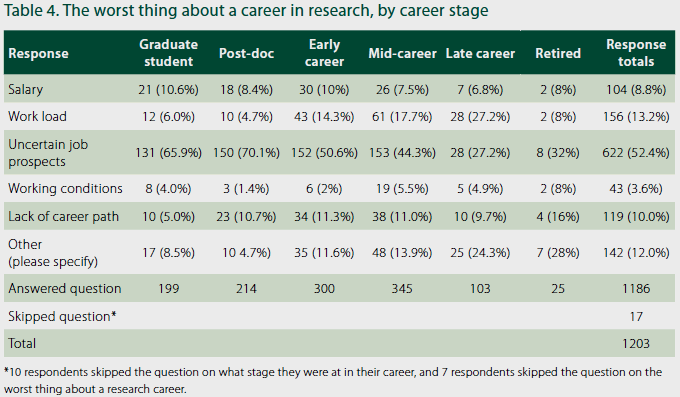|
|
|
|
|
|
|
News & Views item - February 2013 |
![]() Career Support for Researchers According to ACOLA. (February 9, 2013)
Career Support for Researchers According to ACOLA. (February 9, 2013)
In 2012 the Australian Department of Industry, Innovation, Science, Research and Tertiary Education requested the Australian Council of Learned Academies (ACOLA) to determine "Career support for researchers: Understanding needs and developing a best practice approach". ACOLA in turn commissioned Toss Gascoigne and Associates (with Econnect Pty Ltd) who invited "all individual researchers in Australia to provide their views through an on-line survey. Key institutions, including ARC, CSIRO, the universities and other institutes and research facilities were invited to make written submission. Selected respondents were then invited to attend focus groups in a number of cities, to flesh out the issues raised in the survey responses. The sample size of the online survey (1,203 respondents) and the workshops (55 participants) is a small cross-section of some 140,000 people working in the research sector in Australia.
In November 2012 ACOLA issued
a 60-page report![]() based on the analyses of the survey which summaries that "young Australian
scientists are finding it very difficult to locate jobs in the fields they've
trained for after they've graduated" because there is a glut of PhDs: "The view
that too many PhD students are being accepted by universities for the research
and teaching positions currently available was a persistent sub-theme in the
study group," the respondents" described the scramble for grants and positions
as 'disheartening' and said too many people were competing for a limited number
of positions."
based on the analyses of the survey which summaries that "young Australian
scientists are finding it very difficult to locate jobs in the fields they've
trained for after they've graduated" because there is a glut of PhDs: "The view
that too many PhD students are being accepted by universities for the research
and teaching positions currently available was a persistent sub-theme in the
study group," the respondents" described the scramble for grants and positions
as 'disheartening' and said too many people were competing for a limited number
of positions."
Participants questioned the motivation of universities in recruiting students, saying the attraction is that students attract government funding and (in some disciplines) are a source of cheap labour in the laboratory or field. These incentives lead university staff to encourage more students to undertake PhDs, to 'crank out' graduates even though the employment outlook in research was bleak and the Australian economy currently lacks the capacity to absorb these graduates.
Bob Williamson, a molecular genetics professor at the University of Melbourne and secretary for science policy at the Australian Academy of Science (which is a member of ACOLA), in an e-mail to Science Careers writes that the report's findings are worrisome because "the PhD in Australia involves deep immersion in a narrowly defined research project, and was always seen as training for a research career. … Anyone who wants to see a highly educated cohort of well qualified post-graduates is pleased that so many of our students get PhDs, but also believes that the education they receive should be adapted so PhD students are exposed to and acquire wider skills, in finance, communication and human relations."

Michael Price a staff writer for Science Careers adds in his write-up of February 8, 2013:
Williamson says that one of the biggest obstacles to change will be convincing universities to abandon a system that, at the moment, works for them. Real change, he writes, will have to come from students voting with their feet. "I expect the best students will choose universities that offer opportunities to extend career options, especially at a time when every person entering the workforce has to be flexible and anticipate that they will fulfill many roles over a lifetime," he writes.
Before they can vote with their feet, however, scientists in training need good
information about career outcomes, which—in Australia as in the United
States—few of them have. As one biochemistry postdoc responded in the report: "I
am yet to meet a single PhD student who was told how hard it would be to get a
job at the other end."
In this case perhaps we might paraphrase Noel Coward: "Don't let your daughter/son go into science Mrs Worthington".